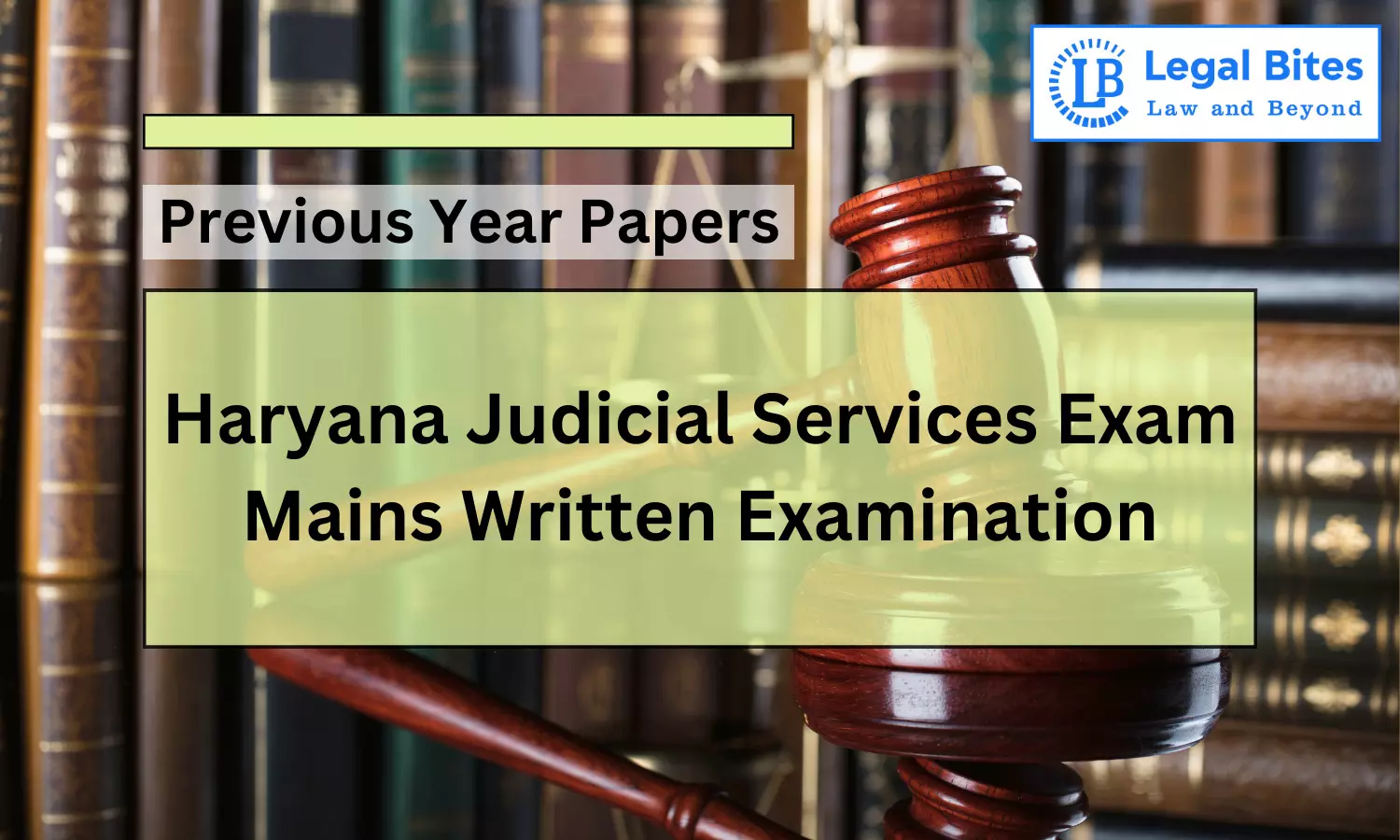Haryana Judicial Services Mains 2022 Previous Year Paper (English)
Candidates preparing for Haryana Judicial Services should solve the Haryana Judicial Services Mains 2022 Previous Year Paper and other previous year question papers before they face Prelims and Mains.

Candidates preparing for Haryana Judicial Services should solve the Haryana Judicial Services Mains 2022 Previous Year Paper and other previous year question papers before they face Prelims and Mains.
Additionally, it gives an idea about the syllabus and the way to prepare the subjects by keeping the previous year's questions in mind. All toppers are mindful and cognizant of the types of questions asked by the HCS, to be aware of the various tricks and types of questions. This should be done by every aspirant when starting their preparation. It is very important to have an overall understanding of the pattern and design of questions.
Only practising authentic question papers will give you a real feel of the pattern and style of the questions. Here's Haryana Judicial Services Mains 2022 Previous Year Paper (Criminal Law).
Haryana Civil Services (Judicial Branch) Mains Written
Examination 2022
ENGLISH
Time: Three Hours
Maximum Marks: 200
Notes:
- Attempt all questions in the same order in which they appear in the question paper.
- Marks for individual questions are indicated against each question.
- Support your answers with relevant provisions and case law.
- No extra answer sheet will be provided.
Question 1
Write an essay on any one of the following topics in about 1000-1100 words:
i) The Advantages and Pitfalls of Online Education.
ii) Education is a Progressive Discovery of Our Own Ignorance.
iii) The Future of Agriculture in India.
iv) Is Common Civil Code a necessity in India?
v) Is Judicial Activism useful for Civil Society? (100 Marks)
Question 2
Make sentences using the following words: (25 Marks)
i) invincible
ii) diffident
iii) atrocity
iv) infallible
v) collude
vi) deprecate
vii) pragmatic
viii) amnesia
ix) cryptic
x) insinuate
Question 3
Make a precis of the following passage in about one-third of its original length, and also assign a suitable title to it:
Our freedom was won with great struggle and sacrifice after centuries of servitude to foreign rule, and it is important that those of us who belong to the post-independence generation should not fall into the error of taking our freedom for granted. The maintenance and strengthening of freedom is a task even more onerous than its attainment. In any nation, the youth necessarily form the vanguard in most spheres of activity, and it is essential that at this critical juncture, its power must be mobilized further to strengthen our integrity and our capacity to resist aggression. What is required is an immense burst of idealism and energy among our youth, who must be deeply committed to the task of safeguarding this great nation of ours founded on the twin ideals of secularism and democracy. In particular, our young men and women studying in schools, colleges and universities have a special responsibility. For, while they are no longer children they have not yet got fully involved in the routine of adult life. They constitute an immense reservoir of strength which, of properly channelized, can prove to be source of great power to the nation. Indeed, it is these young Indians who will soon be called upon to provide leadership in all walks of national life, and they must themselves to fulfill their future responsibilities with distinction. The building up of a vast and pulsating democratic nation is no mean undertaking. Mere desire to be of service is not enough; it must be accompanied by the ability to do so effectively. There are several distinct dimensions in which our youth must equip themselves. The first is physical. Building a great democracy and defending it from predatory aggressors requires a young generation that is physically strong, with muscles of iron and nerves of steel, for this it must equip itself by undertaking physical training and developing fitness to the maximum extent possible. (25 Marks)
Question 4
Read the following passage carefully and answer the questions given below:
While translating from one language to another, several problems crop up. Every language is tethered to its culture and society. When a translator has to translate, he may not find the exact equivalent word. Every language is distinguished by its own idioms, proverbs and colloquial expressions. There are many English words which are now accepted in Hindi. As a result of the interaction between the· British and the Indians, Hindi Words have become a part of the English vocabulary. A living language is constantly in a process of development. The English language is continuously being renewed by importations from commonwealth countries. During the process of translation, we also begin to understand the culture of the other language. This leads to a great sense of tolerance and understanding of diverse cultures. We will have no problem in understanding their customs and ways of life in case we have access to the literature of that culture.
- Why is it difficult to translate from one language to another?
- What are the peculiarities of every language?
- What makes a language living?
- What is the positive outcome of the process of translation?
- What happens when we have access to literature of a particular culture? (25 Marks)
Question 5
Correct the following sentences:
i) She is one of the best athlete in our country.
ii) He and I are brothers.
iii) You should have return it soon.
iv) He acceded on my request
v) We are discussing a more major issue.
vi) Hard work is key of success.
vii) I was informed that his father has passed away long before he joined the army.
viii) When you will complete this project, you will be promoted as the project manager.
ix) The match had hardly started then he was shown a red card and sent off the field.
x) I have finished my work yesterday. (25 marks)
Important Links

